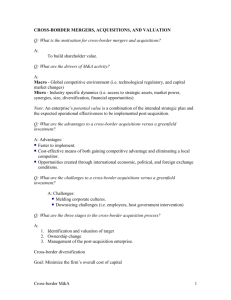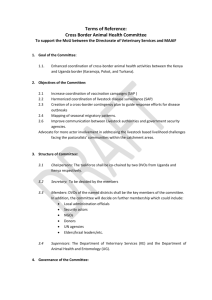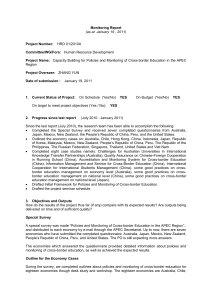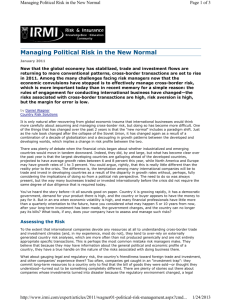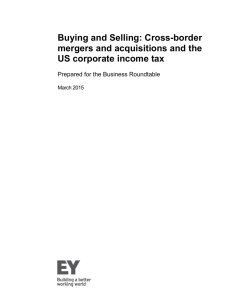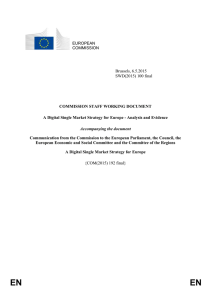Contract law business panel - questionnaire.doc
advertisement
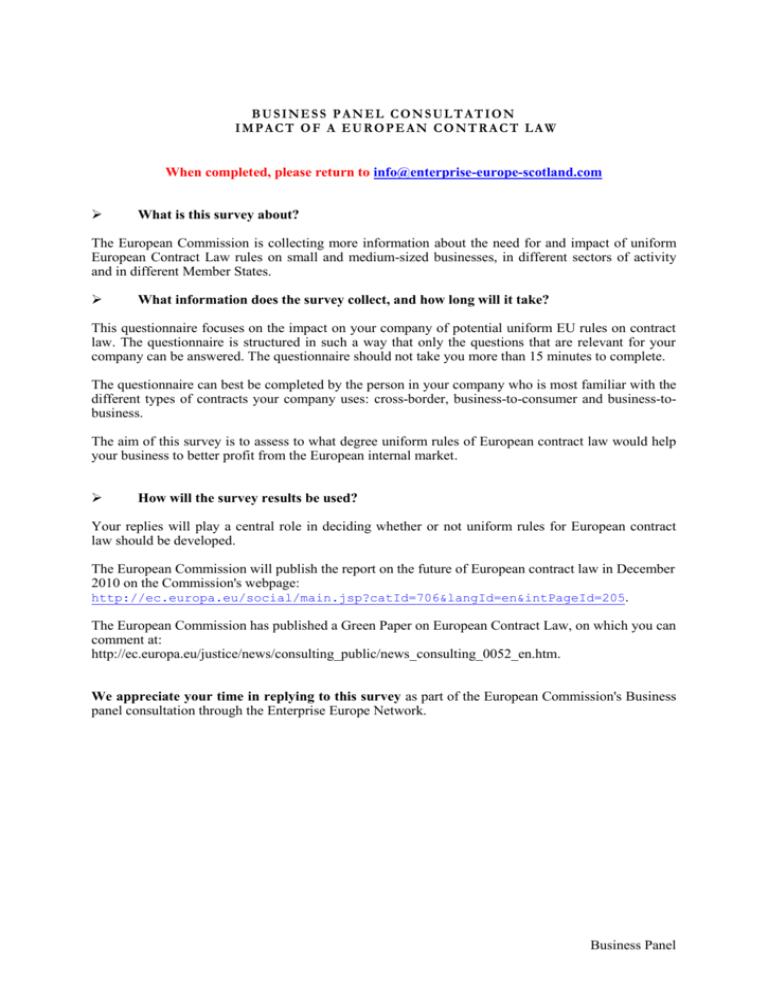
BUSINESS PANEL CONSULTATION IMPACT OF A EUROPEAN CONTRACT LAW When completed, please return to info@enterprise-europe-scotland.com What is this survey about? The European Commission is collecting more information about the need for and impact of uniform European Contract Law rules on small and medium-sized businesses, in different sectors of activity and in different Member States. What information does the survey collect, and how long will it take? This questionnaire focuses on the impact on your company of potential uniform EU rules on contract law. The questionnaire is structured in such a way that only the questions that are relevant for your company can be answered. The questionnaire should not take you more than 15 minutes to complete. The questionnaire can best be completed by the person in your company who is most familiar with the different types of contracts your company uses: cross-border, business-to-consumer and business-tobusiness. The aim of this survey is to assess to what degree uniform rules of European contract law would help your business to better profit from the European internal market. How will the survey results be used? Your replies will play a central role in deciding whether or not uniform rules for European contract law should be developed. The European Commission will publish the report on the future of European contract law in December 2010 on the Commission's webpage: http://ec.europa.eu/social/main.jsp?catId=706&langId=en&intPageId=205. The European Commission has published a Green Paper on European Contract Law, on which you can comment at: http://ec.europa.eu/justice/news/consulting_public/news_consulting_0052_en.htm. We appreciate your time in replying to this survey as part of the European Commission's Business panel consultation through the Enterprise Europe Network. Business Panel BUSINESS PANEL – QUESTIONNAIRE A. Profile of your company 1. In which Member State is your business established? 2. How many employees do you have in your company? a. b. c. d. Less than 10 10-49 50-250 Don't know 3. Which is the main business activity of your company? a. b. c. d. e. f. g. h. i. Sale of goods and digital products (for instance CDs, DVDs, software, on-line music and films) Lease of goods Financial services (including insurance contracts) Telecommunication services Transport services Professional and other services Manufacturing and construction Technology Other - please specify: ……………. 4. Who are your main customers? a. b. c. d. Consumers Businesses Both consumers and businesses Don't know 5. You are currently closing cross-border contracts with partners from how many other Member States? a. b. c. d. e. f. We conclude only domestic contracts in our country From 1-2 other EU countries From 3-5 other EU countries From 6 or more EU countries With EU countries and non-EU countries Don't know Business Panel B. Problems you currently encounter in cross-border transactions BUSINESS-TO-CONSUMER contracts In transactions with consumers, minimum standards of protection apply all over Europe. European Member States could however adopt more protective rules. Furthermore, uniform conflict-of-law rules ensure that consumers are adequately protected when dealing with businesses from other Member States. Thus, where the business sells goods to the country of residence of the consumer, the contract cannot deprive the consumer of the protection afforded by his national law. Companies may lack the capacity to respond to regulatory provisions in the consumer market. For example, in 61% of cross-border e-commerce offers, consumers are not able to place an order, mainly because businesses do not serve the consumer's country. 6. Which of the following sales channels do you use most? a. Distance sales (for instance Internet, telephone) b. Face-to-face (on-premises, doorstep selling) c. Both distance and face-to-face d. Don't know 7. Have you refused to sell to consumers based in other Member States who approached your company? a. Yes (go to next question) b. No (go to question 9) 8. How often have you refused to sell to foreign consumers because of differences in consumer protection rules in the contract laws of other Member States? a. Always; b. Over 50% of all instances where such opportunities arose; c. Between 10% and 49% of all instances where such opportunities arose; d. Under 10% of all instances where such opportunities arose; e. Never; f. Don't know C. Problems you currently encounter in cross-border transactions - ALL The existence of 27 national legal systems inevitably results in differences of national contract laws, Cross-border transactions are not governed by the same rules. Since applying different contract law regimes and adapting the contracts to them could be complex and costly, businesses may be dissuaded from cross-border trade. Business Panel 9. In your opinion, how important are the following potential obstacles for cross-border business within the EU? (please tick one box per line) Very Of minor important Important importance Not important at all Don't know a. Language b.Finding out about the provisions of the applicable foreign contract laws c. Translation of foreign applicable contract law d.Obtaining legal advice on foreign contract law e. Cultural differences f. Tax regulations in other Member States g. Other national regulations, e.g. authorisation and certification schemes, registration procedures h. Difficulty of negotiating with the other contractual party which contract law should apply i. Litigation which involves the application of a foreign contract law j. Lack of information on/trust in the contract law which governs / would govern your contract k. Problems of cross-border delivery/transportation l. After-sales maintenance m. Other – please specify: 10. If you answered "important" or "very important" to Points b), c), d), h), i) and j) of Question 9 above, how often did these obstacles dissuade you from conducting crossborder transactions? a. Always; b. Over 50% of all instances where such opportunities arose; c. Between 10% and 49% of all instances where such opportunities arose; d. Under 10% of all instances where such opportunities arose; e. Never; f. Don't know Business Panel D. A European Contract Law – your views on possible solutions At present, the contract laws in all the Member States of the EU differ. A single European legal framework does not exist and this situation could raise additional costs to businesses wishing to trade in other Member States, in particular for SMEs. Businesses could continue to deal with the current situation, or, as a solution to these problems, one could design a set of European contract law rules which could apply across the EU. 11. How favourably do you view the concept of a single European contract law? a. Very favourably b. Favourably c. Not very favourably d. Not at all favourably e. Don't know 12. Would you prefer …? a. A European contract law that replaces national contract law b. An optional European contract law at your choice in addition to existing national contract laws c. Don't know 13. If an optional European contract law at your choice were to be established, how likely would you be to use it in connection with cross-border transactions? a. Very likely b. Likely c. Not very likely d. Not at all likely e. Don't know 14. If a European contract law regime would be developed, what would you prefer? [ONLY ONE ANSWER IS POSSIBLE] a. A European contract law only for cross-border transactions b. A European contract law for both cross-border and domestic transactions c. Don't know 15. If a European contract law regime would be developed, what would you prefer: [ONLY ONE ANSWER IS POSSIBLE] a. A European contract law applicable in transactions with consumers b. A European contract law applicable in transactions between businesses c. Both of the above d. Don't know E. A European Contract Law – your views on possible impacts 16. Would there be cost savings for your business if you could use a single European contract law regime in your transactions across the EU? a. Yes (go to following question) b. No (go to question 18) Business Panel 17. If you could use a single European contract law in transactions across the EU, please estimate the cost savings from saved transaction costs (for example legal fees, research and translation of foreign law) for expanding your activity in one additional EU country: a. Less than EUR 5 000 b. EUR 5 000 – 10 000 c. EUR 10 000 – 15 000 d. EUR 15 000 – 30 000 e. More than 30 000 f. Don't know 18. If you could use a single European contract law across the EU, please estimate the impact on developing economies of scale (for example, using a single IT platform and a single contract): a. Large impact b. Some impact c. Minimal impact d. No impact e. Don't know 19. If you could apply a single European contract law for all your cross-border transactions, what would be most likely? a. We would expand our business activities to countries where we are not yet active (go to following question); b. We would expand our business activities in the countries where we are already active c. There would be no change d. We would decrease our business activities e. Don't know 20. If you have chosen Option a) in the question 19, please indicate in how many new countries are you likely to start business activities? a. b. c. d. F. In 6 or more new EU countries In 3-5 new EU countries In 1-2 new EU countries Don't know Open question about a European contract law 21. Do you wish to express any ideas, suggestions or comments about a possible EU instrument in European contract law? Please use this opportunity to share any relevant experiences or stories which illustrate your answers. ********************************************************************************** Thank you for taking the time to complete the questionnaire. Your answers will provide a valuable input for analysing the needs of businesses in the EU regarding. When completed, please return to info@enterprise-europe-scotland.com Business Panel
